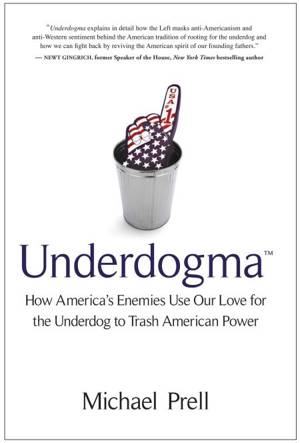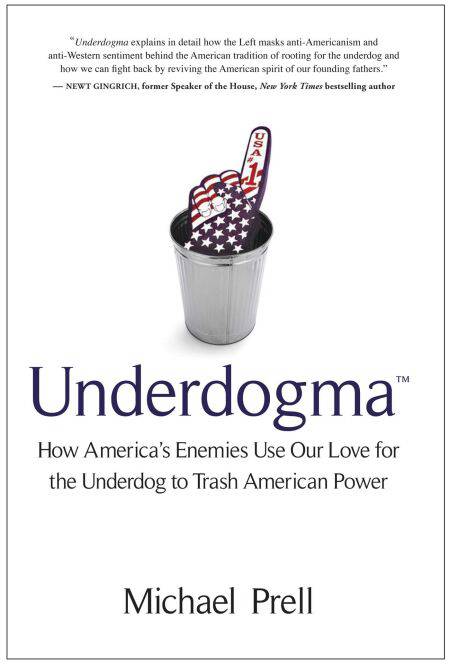
- Afhalen na 1 uur in een winkel met voorraad
- Gratis thuislevering in België vanaf € 30
- Ruim aanbod met 7 miljoen producten
- Afhalen na 1 uur in een winkel met voorraad
- Gratis thuislevering in België vanaf € 30
- Ruim aanbod met 7 miljoen producten
Zoeken
Underdogma E-BOOK
How America's Enemies Use Our Love for the Underdog to Trash American Power
Michael Prell
€ 14,53
+ 14 punten
Uitvoering
Omschrijving
“Analyzing and refuting the common assumptions of anti-Americanism is a critical contribution to the global political debate. Thank goodness for this effort."
—UN Ambassador John Bolton, author of Surrender is Not an Option
David versus Goliath, the American Revolutionaries, "The Little Engine That Could," Team USA's "Miracle on Ice," the Star Wars Rebel Alliance, Rocky Balboa, the Jamaican bobsled team and the meek inheriting the Earth.
Everyone, it seems, loves an underdog. Why is that?
We begin life tiny and helpless, at the mercy of those who are bigger and more powerful than us: parents and guardians who tell us what to eat, what to wear, how to behave (even when to sleep and wake up). From childhood into adulthood, we're told what to do by those who wield more power—our parents, teachers, bosses government. So naturally, we have a predisposition to resent the overdogs and root for the little guy.
But this tendency, which international political consultant and human rights activist Michael Prell calls “underdogma," can be very dangerous – both to America and to the world at large.
In Underdogma, Prell, who has worked world leaders including Israeli Prime Minister Benjamin Netanyahu, the Australian and Canadian prime ministers and the Dalai Lama, explores our love/hate relationship with power within our culture and our politics. Underdogma explains seeming mysteries such as why:
Almost half of Americans blamed President Bush for the attacks of 9/11, even while the American media described the architect of these attacks as “thoughtful about his cause and craft" and “folksy."
Gays and lesbians protest those who protect gay rights (America, Israel), while championing those who outlaw and execute homosexuals (Palestine).
Environmentalists focus their rage on America, even though China is the largest emitter of greenhouse gases.
The United Nations elevates countries such as Sudan to full membership on the UN's Commission on Human Rights, even as the ethnic cleansing of Darfur proceeds.
Tracing the evolution of this belief system through human history—ancient Greece to Marxism to the dawn of political correctness—Prell shows what continuing with this collective mindset means for our future. While America and its president increasingly exalt the meek and apologize for their power, America's competitors and enemies are moving in a different direction. China is projected to overtake the U.S. economically by 2027 and is ready to move into the position of hegemon, and radical Islamists are looking to extend their global territory, taking any sign of weakness as a chance to attack.
America must return to its founding spirit, and underdogma must stop now—our nation depends on it.
—UN Ambassador John Bolton, author of Surrender is Not an Option
David versus Goliath, the American Revolutionaries, "The Little Engine That Could," Team USA's "Miracle on Ice," the Star Wars Rebel Alliance, Rocky Balboa, the Jamaican bobsled team and the meek inheriting the Earth.
Everyone, it seems, loves an underdog. Why is that?
We begin life tiny and helpless, at the mercy of those who are bigger and more powerful than us: parents and guardians who tell us what to eat, what to wear, how to behave (even when to sleep and wake up). From childhood into adulthood, we're told what to do by those who wield more power—our parents, teachers, bosses government. So naturally, we have a predisposition to resent the overdogs and root for the little guy.
But this tendency, which international political consultant and human rights activist Michael Prell calls “underdogma," can be very dangerous – both to America and to the world at large.
In Underdogma, Prell, who has worked world leaders including Israeli Prime Minister Benjamin Netanyahu, the Australian and Canadian prime ministers and the Dalai Lama, explores our love/hate relationship with power within our culture and our politics. Underdogma explains seeming mysteries such as why:
Almost half of Americans blamed President Bush for the attacks of 9/11, even while the American media described the architect of these attacks as “thoughtful about his cause and craft" and “folksy."
Gays and lesbians protest those who protect gay rights (America, Israel), while championing those who outlaw and execute homosexuals (Palestine).
Environmentalists focus their rage on America, even though China is the largest emitter of greenhouse gases.
The United Nations elevates countries such as Sudan to full membership on the UN's Commission on Human Rights, even as the ethnic cleansing of Darfur proceeds.
Tracing the evolution of this belief system through human history—ancient Greece to Marxism to the dawn of political correctness—Prell shows what continuing with this collective mindset means for our future. While America and its president increasingly exalt the meek and apologize for their power, America's competitors and enemies are moving in a different direction. China is projected to overtake the U.S. economically by 2027 and is ready to move into the position of hegemon, and radical Islamists are looking to extend their global territory, taking any sign of weakness as a chance to attack.
America must return to its founding spirit, and underdogma must stop now—our nation depends on it.
Specificaties
Betrokkenen
- Auteur(s):
- Uitgeverij:
Inhoud
- Aantal bladzijden:
- 280
- Taal:
- Engels
- Reeks:
Eigenschappen
- Productcode (EAN):
- 9781935618652
- Verschijningsdatum:
- 31/01/2011
- Uitvoering:
- E-book
- Beveiligd met:
- Adobe DRM
- Formaat:
- ePub

Alleen bij Standaard Boekhandel
+ 14 punten op je klantenkaart van Standaard Boekhandel
Beoordelingen
We publiceren alleen reviews die voldoen aan de voorwaarden voor reviews. Bekijk onze voorwaarden voor reviews.











